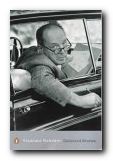a critical examination of Nabokov’s collected stories
 ‘Signs and Symbols’ (1947) is one of the shortest of all Nabokov’s stories. Dealing with the poorer and more desperate side of émigré life in America, it strikes an amazingly similar note to that sounded by Isaac Bashevis Singer in his own stories dealing with the same topics – though of course the two writers also have in common their émigré status, their bi-lingualism, and the fact that they were both from eastern Europe.
‘Signs and Symbols’ (1947) is one of the shortest of all Nabokov’s stories. Dealing with the poorer and more desperate side of émigré life in America, it strikes an amazingly similar note to that sounded by Isaac Bashevis Singer in his own stories dealing with the same topics – though of course the two writers also have in common their émigré status, their bi-lingualism, and the fact that they were both from eastern Europe.
The story centres on an elderly émigré couple whose son has become incurably deranged with an acute form of paranoia. On his birthday they try to visit him in hospital, but are dissuaded by the staff from doing so because he has recently attempted to commit suicide. They return home saddened by the harshness of their fate and the hopelessness of the situation. Finally the husband decides that no matter what the circumstances they must bring the boy home to live with them. Whilst they are discussing the details they are interrupted twice by telephone calls – both of which turn out to be wrong numbers. The story ends with the telephone ringing a third time.
Nabokov has a long term interest in various forms of madness – which he puts to grotesque and comic effect in novels such as Despair and Pale Fire. Here, the son’s ‘referential mania’ (ND,p.64) is detailed in a manner which recalls Borges’s ‘Funes, the Memorious’ written six years earlier:
‘Clouds in the staring sky transmit to one another, by means of slow signs, incredibly detailed information regarding him. His inmost thoughts are discussed at nightfall in manual alphabet, by darkly gesticulating trees’ (p.64)
There is a sense in which this is the second subject in the story, running parallel with the first, which is the harshness of the couple’s life as émigrés. They are poor, living on the support of a relative, and they are getting old. Behind them they have the flight of émigrés – ‘Minsk, the Revolution, Leipzig, Berlin’ (p.66) – and relatives who have perished:
‘Aunt Rosa, a fussy, angular, wild-eyed old lady, who had lived in a tremulous world of bad news, bankruptcies, train accidents, cancerous growths – until the Germans put her to death, together with all the people she had worried about’ (p.66)
But the separate subjects are given two links. The first is the most obvious – that to have an incurably mad son is yet another misfortune to add to the rest. The second is the connection offered by the implied ending to the story. As a radical traditionalist, Nabokov is here combining two well-tested and yet apparently contradictory strategies of closure – the open-ended narrative, and the dramatic twist.
The story ends with the two wrongly numbered telephone calls and an upturn to the elderly man’s feelings as he contemplates a birthday present of selected jams he has bought for his son:
‘His clumsy moist lips spelled out their eloquent labels: apricot, grape, beech plum, quince. He had got to crab apple, when the telephone rang again’ (p.70)
We are given no further information, but it is impossible to escape the implication that the call is from the hospital with news of another and this time successful suicide attempt. For if it were another wrong number there would be no relation at all between these calls and the remainder of the story.
It is not possible to ‘prove’ that this is the case, but it is quite obvious that Nabokov is inviting the reader to supply the missing explanation.Thus the old man and his wife do have a further blow waiting for them, and the second link between the two subjects is made – in the reader’s mind.
As Sean O’Faolin argues, this is a hallmark of the truly modern short story – courting brevity by leaving the reader to work out what is being suggested or implied:
‘Telling by means of suggestion or implication is one of the most important of all the modern short story’s shorthand conventions. It means that a short story writer does not directly tell us things so much as let us guess or know them by implying them” (O’Faolain,p.138)
© Roy Johnson 2005
![]() Vladimir Nabokov: The Collected Stories – Amazon UK
Vladimir Nabokov: The Collected Stories – Amazon UK
![]() Vladimir Nabokov: The Collected Stories – Amazon US
Vladimir Nabokov: The Collected Stories – Amazon US
Vladimir Nabokov web links
Vladimir Nabokov greatest works
Vladimir Nabokov criticism
Vladimir Nabokov life and works